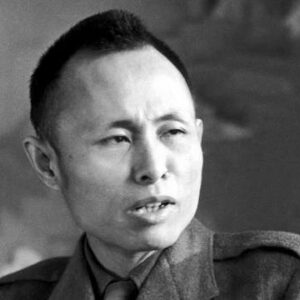Aung San was a Burmese-born revolutionary nationalist leader. He is considered the founding father of modern-day Burma. He was the founder of the Burmese Communist Party and was instrumental in the country’s independence from British domination. His anti-British and anti-imperialist politics represented his beliefs. After joining the Dobama Asiayone or Our Burma Union, he became a ‘Thakin’ and began his political career in national politics. He was instrumental in the formation of the All-Burma Peasants League. He was a key figure in the formation of the Freedom Bloc, alongside Dr. Ba Maw. During WWII, Japanese Emperor Hirohito bestowed the Order of the Rising Sun upon him. He organized a Burmese military force, the Burma Independence Army, with the assistance of the Japanese. Later, he grew skeptical of the Japanese pledges of full freedom for Burma and defected to the Allies. He was instrumental in the founding of the Anti-Fascist Organization. He helped the Allies beat the Japanese by leading the Burmese National Army in a revolution against the Japanese occupiers. His successful negotiating at the Panglong Conference marked a significant step toward Burma’s independence. He was unfortunately killed just six months before Burma gained independence.
Childhood and Adolescence
Aung San’s father, U Pha, was a lawyer who was born in Natmauk, Magway District, central Burma. His great uncle Bo Min Yaung fought against the British conquest of Burma in 1886, and his family was prominent in the Burmese resistance movement.
In Natmauk, he attended a Buddhist monastic school for his primary schooling. He later completed his secondary studies at Yenangyaung High School.
He enrolled at Rangoon University in 1933. He was elected to the Rangoon University Students’ Union’s executive committee. He was also the editor of “Oway,” the Union’s magazine.
Both the Rangoon University Student Union (RUSU) and the All-Burma Students Union elected him president in 1938. (ABSU). This year, the government also assigned him to the Rangoon University Act Amendment Committee as a student representative. He earned a B.A. in English Literature, Modern History, and Political Science from the University the same year.
Aung San’s Career
In 1939, he joined the nationalist organization ‘Dobama Asiayone’ and rose through the ranks to become its secretary-general. He was the organization’s general secretary until August 1940. During his time with ‘Dobama Asiayone,’ he coordinated the ME 1300 Revolution, a nationwide strike.
He was also instrumental in the formation of another nationalist organization, the Freedom Bloc, and served as its general secretary. In August 1939, he was a founding member and the first secretary-general of the Communist Party of Burma (CPB).
He co-founded the People’s Revolutionary Party after a limited period. This party was renamed the Socialist Party after World War II. He attended the Indian National Congress Assembly in Ramgarh, India, in March 1940.
He fled Burma after the British government issued an arrest order for him due to his attempts to organize a revolution against the British. He first traveled to China to seek assistance from the Kuomintang’s nationalist administration. However, Japanese military occupiers in Amoy thwarted his attempt and persuaded him to return to Japan. The government of Fumimaro Konoe gave him arms and financial assistance.
In February 1941, he returned to Burma. He returned to Japan for military training for a brief time. This time, he was accompanied by the Thirty Comrades, the first batch of youthful revolutionaries, on his journey to Japan.
Colonel Suzuki, the head of the Minami Kikan, assisted him in forming the Burma Independence Army (BIA) in Bangkok, Thailand, in 1941. During World War II, this group supported Japan.
When the Japanese captured Rangoon in March 1942, the BIA organized a government for the country under Thakin Tun Oke. Until the Japanese disbanded it, this administration ran concurrently with the Japanese military administration.
The Burma Defence Army was founded in July 1942, replacing the BIA (BDA). He rose to the rank of colonel and assumed command of this army.
He became War Minister after the Japanese declared Burma an independent nation, and the Burma Defence Army was renamed the Burma National Army (BNA).
However, he was skeptical of the Japanese claims of actual Burmese freedom.
He led the BNA in a revolt against the Japanese occupiers on March 27, 1945, and with the support of the Allies, defeated the Japanese.
Following the Japanese surrender, he founded the People’s Volunteer Organization, a private political force intended to replace his Burma National Army.
With the support of the Anti-Fascist People’s Freedom League, he became deputy chairman of Burma’s Executive Council at the end of 1946. (AFPFL). Although he was effectively Prime Minister, he was nevertheless subject to the British governor’s veto.
At the Panglong Conference in 1947, he signed a pact with representatives from various national groupings to seek support for a united Burma. The AFPFL gained the majority seats in the election for a Constituent Assembly this year at the general elections.
Personal History and Legacy
He married Khin Kyi in 1942 and the pair had three children: engineer Aung San Oo, eight-year-old Aung San Lin, and Nobel winner Aung San Suu Kyi.
During a meeting of the Executive Council in Rangoon on July 19, 1947, a group of former Prime Minister U Saw’s armed paramilitaries burst into the Secretariat Building and killed Aung San and six of his cabinet ministers.
Estimated Net worth
Aung is one of the wealthiest World Leaders and one of the most popular. Aung San Suu Kyi’s net worth is estimated to be $1.5 million, according to Wikipedia, Forbes, and Business Insider.
Trivia
When he was a student at Rangoon University, this powerful nationalist leader was threatened with expulsion after publishing an article criticizing a senior University official. Due to a university student strike, university administrators later revoked the expulsion decision.


